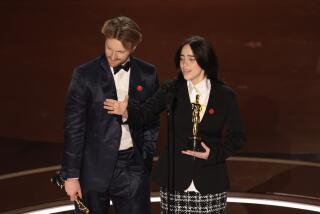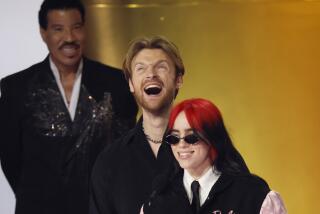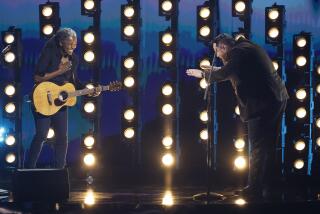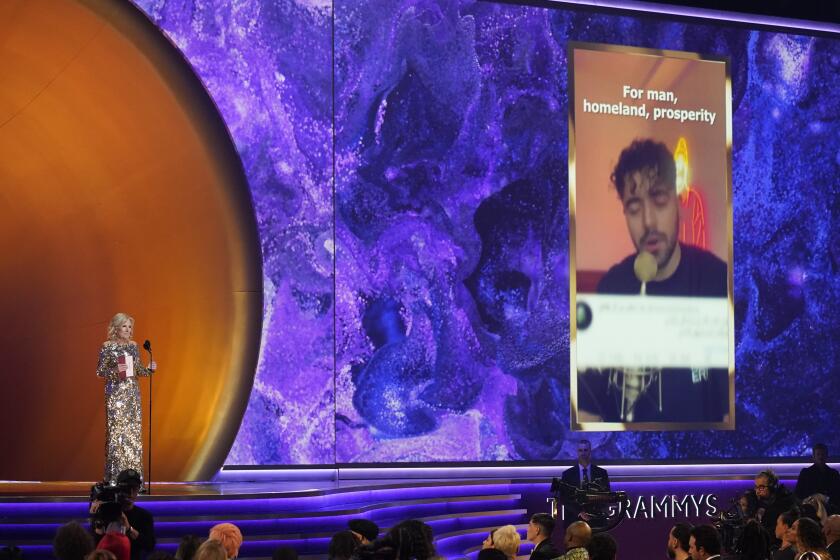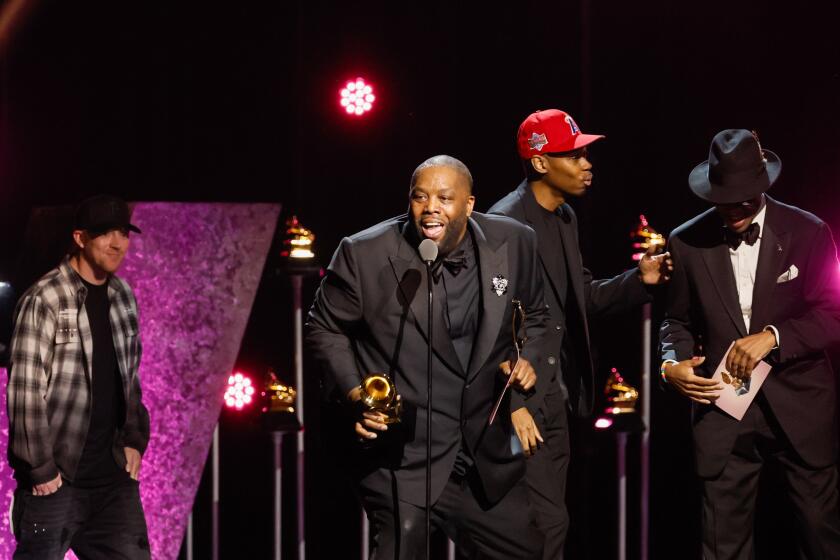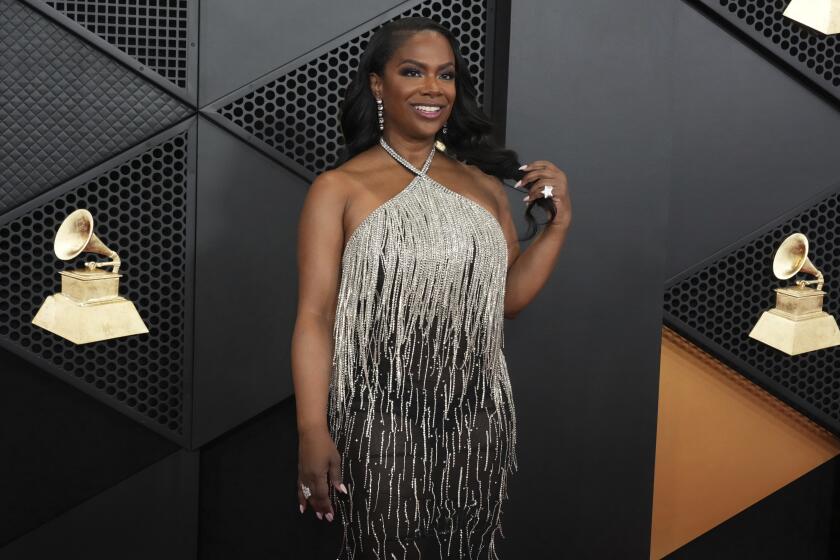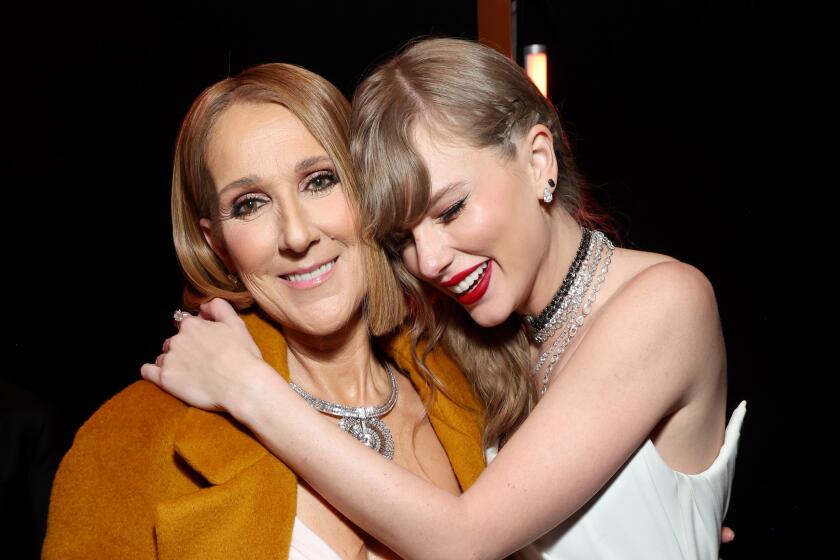Billie Eilish isn’t stressing over the Grammys. She’s busy worrying about the end of the world
In a basement recording studio in her home neighborhood of Highland Park, Billie Eilish was thinking about climate change and the end of the world, and how she might well live to see it.
“It’s weird,” said the 17-year-old electro-goth singer, one of the biggest and most important pop acts to emerge in a generation. “It feels like we’re living in a movie that you’d watch where the world is like ending. We could stop it, but we’re not going to because everybody’s too lazy.
“But listen,” Eilish said, her toxic-green hair and macabre sweatshirt looking ominous as she leaned back in her studio chair. Her mother, Maggie Baird, nodded along from an adjacent couch.
“We’re about to die if we don’t change.”
Professionally, of course, Eilish is doing fine. She’s had the best year of her life, even. The L.A. native is the youngest artist ever to sweep nominations in the big four categories — album, song, record and best new artist —at the Grammys. Her debut Darkroom/Interscope album, “When We All Fall Asleep, Where Do We Go?,” produced and co-written by her 22-year-old brother, Finneas O’Connell, logged billions of streams, including those for her ubiquitous No. 1 Billboard Hot 100 single, “Bad Guy.” The album placed 12 songs in the Hot 100 at once, and pulled two older singles along with it to set a new record for simultaneous Hot 100 tracks by a female artist. She’s been selling out arenas the world over, including two dates at the 18,000-capacity Forum in April, and just was named Billboard’s woman of the year.
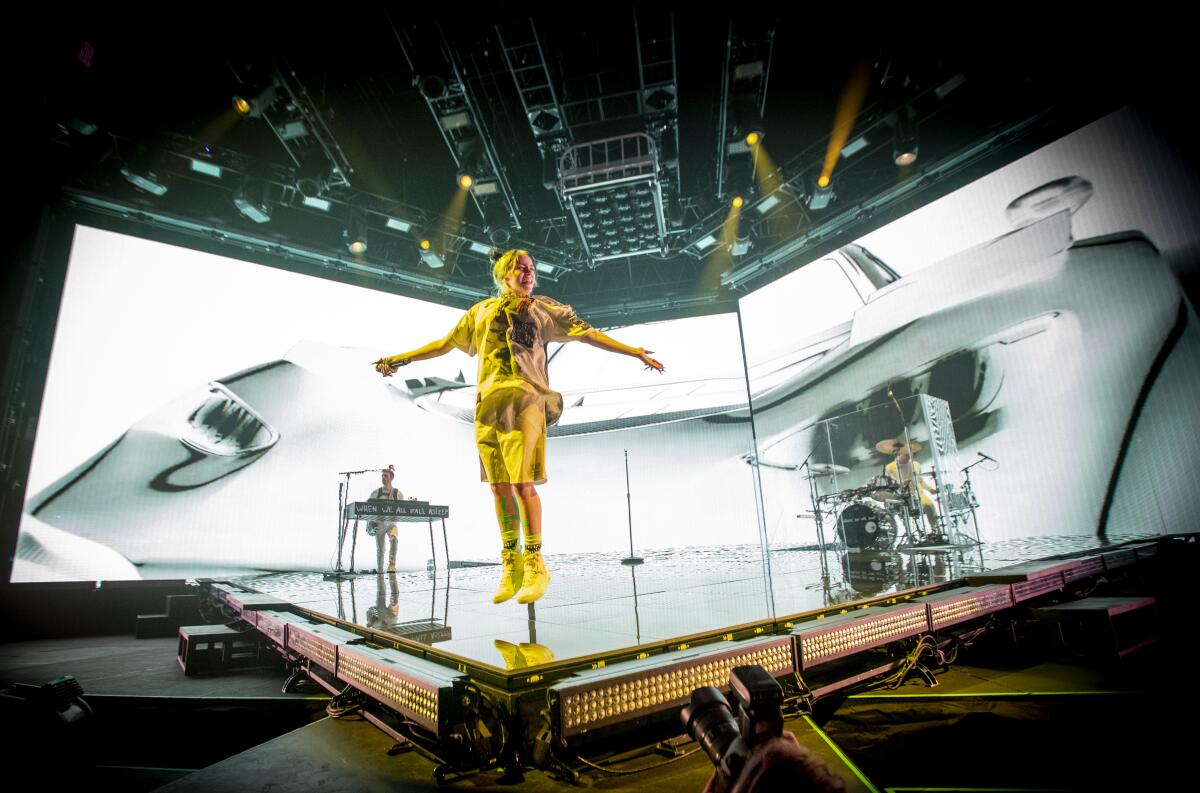
Every conversation about Eilish brings up her age and how much potential she has to be the definitive Gen Z pop artist. But that’s the thing about being the voice of a new generation — there’s a lot of future coming, and even for Eilish, a lot of it is still a bit terrifying.
Right now, though, Eilish may well cap off her ascendant year with several Grammy wins on Jan. 26. In addition to the big four nominations, she’s up for pop vocal album and pop solo performance. For five of the nominations, her brother, O’Connell, is nominated along with her, as he’s quickly taken his place among the upper echelon of pop producers (he has credits on Camila Cabello’s new album and Selena Gomez’s No. 1 “Lose You to Love Me”).
“If we weren’t nominated for anything, I wouldn’t have been disappointed,” O’Connell said. “But being nominated is a huge deal to me. A pie-in-the-sky kind of notion that doesn’t feel like reality.”

You might suspect that O’Connell and his sister, a 17-year-old who makes a sport of subverting the industry’s usual image of stardom (toying around with gender and desexualized raver-metal fashion), wouldn’t care much about the most mainstream of music awards shows. Eilish’s choices, both career and aesthetic, seem designed to needle traditional pop. She only works with her brother to produce her music, eschewing the writing camps that are de rigueur among most top acts. Her songs invert Top 40 sonics, wrapping trap and techno and melancholy rock arrangements around her whisper-soft voice.
But Eilish, it turns out, cares really deeply about the Grammys. She’s from an entertainment-biz family, and both her mom, Baird, and her dad, Patrick O’Connell, are actors. She’s also a veteran artist at this point, first signed at 14 to the Interscope imprint Darkroom and notching her hit “Ocean Eyes” soon after. Her 2017 “Don’t Smile at Me” EP snagged industry attention: Here was a young female artist who wrote her own material, presented a distinct point-of-view and racked up massive streams. For all of her radical aesthetics, she’s come through a fairly traditional major-label long game. She just did it younger than most.
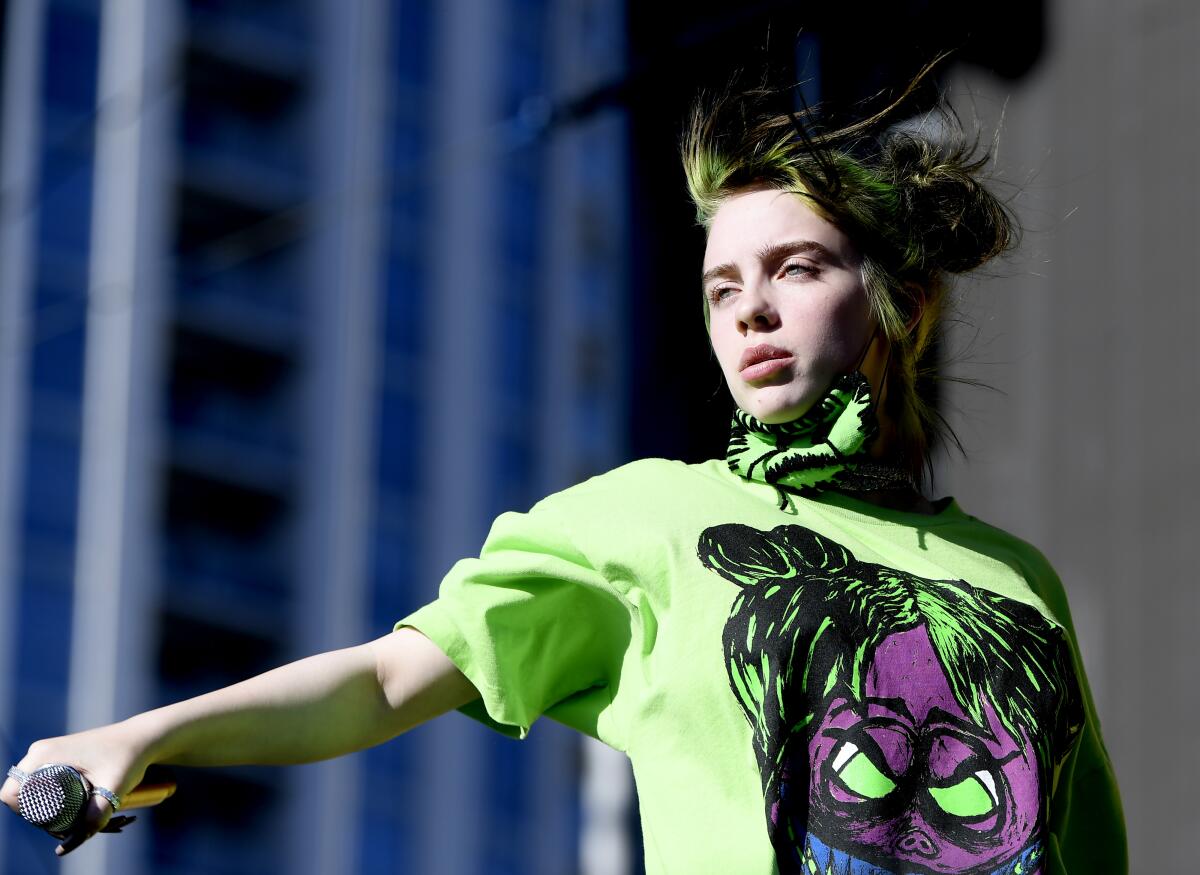
“I never thought it would be a reality,” Eilish said. “I grew up going to the Grammy Museum all the time. I grew up wishing with all my heart that I could just be the fan, not even the artist. And now I’m on the other side of it, which is just like, what the hell is my life?” Eilish recently found herself agape at an industry event, “sitting across from Donald Glover and Tyler, the Creator. Those two people literally, like, shaped who I am.”
The next phases of fame could propel her even further. According to the Hollywood Reporter, Eilish signed a $25-million deal for an Apple TV+ documentary. Her film career is already afoot: she directed the new video for “Xanny,” where off screen hands burn her with cigarettes until she’s seared.
For Interscope’s chairman and CEO, John Janick, Eilish’s Grammy nominations haul is not just an affirmation of her talent and work ethic, but also a changing of the guard in how pop looks and sounds.
“Every year things are shifting a bit, and [the Grammys] are paying attention,” Janick said.
It wasn’t obvious to pitch a teenage nihilist who sings in a demented whisper and dresses like a “Mad Max: Fury Road” mechanic as a Top 40 contender. But the last year has proved Eilish right on all counts.
“Me personally, and speaking for Interscope, we’re not good at changing people or manufacturing things,” Janick said. “We didn’t take any of her songs to radio until 2½ years into the process. We had to give her space to grow and figure it out. We believed from day one that it might be crazy to sign this 14-year-old, but if you’d heard her music and talked with her, you’d say ‘I’d take that chance.’ ”
For Eilish, though, the head-spinning rise from goth-pop prodigy to one of the world’s biggest artists, full stop, had some deep personal costs.
“Everything I Wanted,” her first single since the album’s March release, seems to tackle the price of fame directly. Over her brother’s sad, distorted keyboard, she sings with uncomfortable intimacy: “I had a dream, I got everything I wanted / Not what you think, and if I’m being honest / It might’ve been a nightmare.”

She’d have reasons to be nervous about it, given that fans began lurking around her family’s longtime home in Highland Park, and the trials of career and fame dissolved all but the closest friendships in her life. What should have been an affirmation of her vision sometimes turned, instead, into the waking nightmare of isolation and disconnection she’d feared.
“Last year was maybe the worst,” she said. “I felt like I missed everything, as annoying as that sounds. People would give anything to do what I did last year, but I didn’t care. I didn’t want to be famous. I didn’t want to be going on tour and missing all my friends and not be able to go to the store. I wanted to be a kid and go break something and jump over a fence and break into somewhere. It was weird to have all these consequences and people watching me, and I didn’t want it.
“I wasn’t enjoying it and I lost all my friends,” she continued, recounting that she’d actually booked a whole extra bus on her arena tour for friends to join her, and it was a bust. “I was really anxious about losing all of my relationships, and I had good reason to worry.”
She’s doing better now. “Over time, I just realized like I was just pitying myself all the time. I was just like, I have the most incredible thing that I get to do,” she said. But she’ll need the bolstering as she tries to follow up a smash like “When We All Fall Asleep.”
It’s a big enough burden to match any album of that caliber, let alone when the job is left almost entirely up to you and your brother, who is barely old enough to drink. But Eilish’s wide-swinging sense of experimentation, and the feverish pace of music on the internet, may actually be assets today.
“We labeled her ‘alternative’ at first because she was actually pretty difficult to position,” said Justin Lubliner, founder of the label Darkroom, which signed Billie in partnership with Interscope. “It’s interesting that she’s labeled pop today, because she’s so different from what pop sounds like.”
“Sophomore releases do have a reputation for being more difficult than first releases, but she’s been putting out music for 3½ years,” Janick said. “She can do whatever she wants. Now you just can put out a song and if it works, great. If not, you can figure out what to adjust.”
Eilish has other big, non-musical adjustments on her mind as well. 2020 will be the first year she’s eligible to vote. She hasn’t made up her mind among the Democratic nominees yet — “I’m going to do all my research. I don’t know what the right thing is, but I think it’s so funny when a lot of adults think that they know what’s right,” she said. (At least one nominee is in her camp: Elizabeth Warren spoke up for her on Jimmy Fallon’s show after middle-aged rock fans were aghast that a Gen Z teenager didn’t know Van Halen.)
The 2016 election outcome gave her reason for skepticism.
“I’m pretty worried about [2020],” she said. “I think stupid Trump is probably going to get reelected, and that makes my heart break. You know, some people just love horrible people. It’s weird.”
On this arena tour, she’s bringing voter registry and eco-activism booths for Greenpeace and Global Citizen to every show. She wore a shirt at the American Music Awards reminding viewers that there’s “No music on a dead planet.”
“I’ve seen a lot of my fans say ‘I’m vegan because of Billie,’ ” Eilish said, “and that’s a big deal to me because you forget that you really can change people’s minds.”
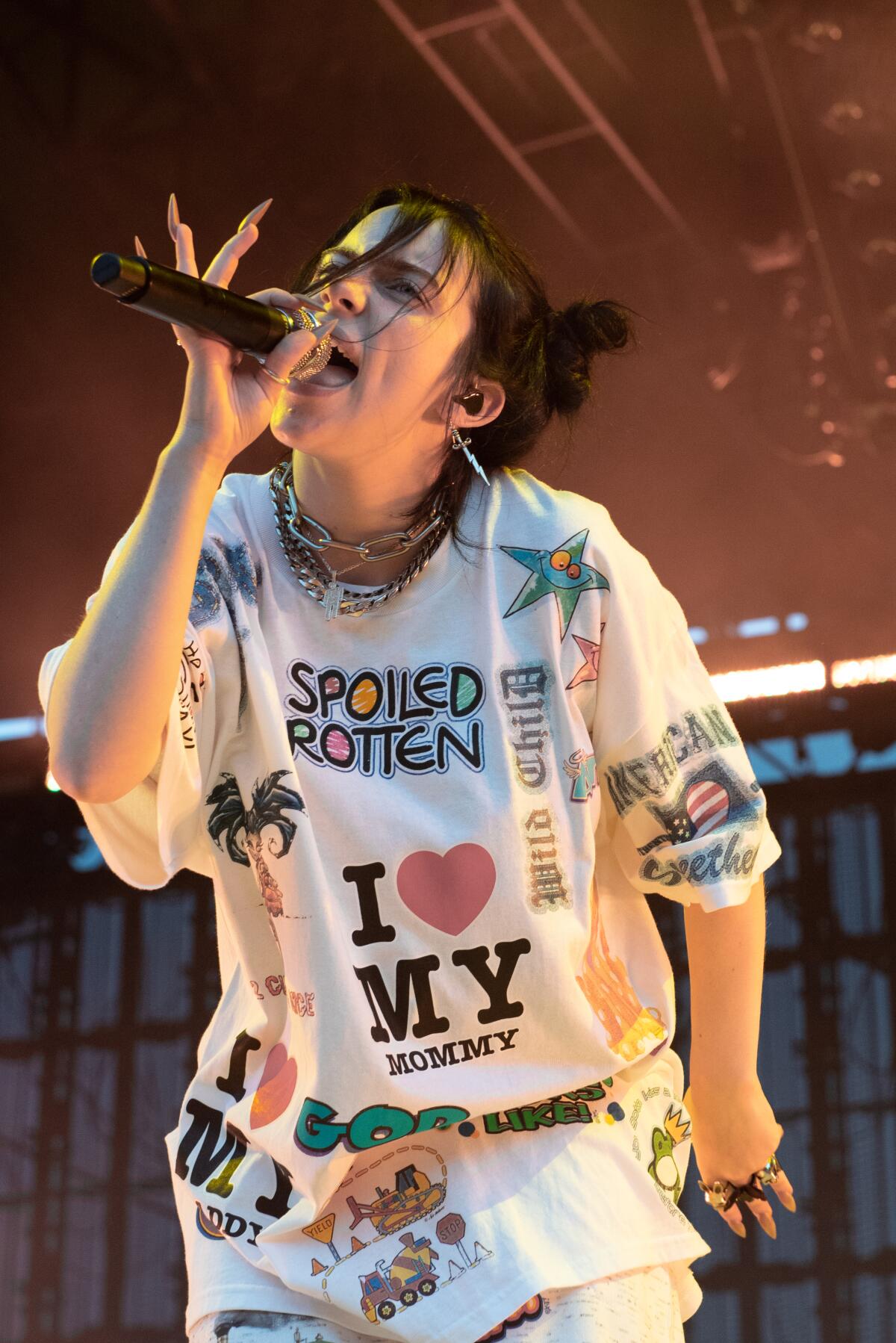
She’d like to change more minds about global warming.
“I’ve had a million dreams about the world ending,” Eilish said. “It makes you realize how nothing we all are, and how little everyone’s lives matter because the world itself, if the world dies, we’re all gone. I want to have children and I want them to have children. That’s possibly not going to happen, and I hate it.”
Her mom chimed in, reaching for some note of optimism about using her platform for good. “Corporations want to cater to teenage girls. You guys could start calling the shots. They’re going to have to follow that.”
If it’s strange to hear someone so young, so successful and adored by her family and industry talk pessimistically about the future, well, not even teenage pop stars are immune from today’s existential dread. Even when you get everything you want from music — insane streaming figures, “Saturday Night Live” and sold-out arenas — it’s all for naught if the ice caps melt.
Eilish, feeling a little exhausted after all the doomsaying, turned back to the studio’s mix console, where her team was rejiggering “When We All Fall Asleep” in a new surround-sound format. In the coming weeks, she’ll likely have to plan her Grammy performance. She might also need to clear space in her Highland Park childhood bedroom for a handful of gold statues, earned just a month or so after she turns 18.
The end of the world may be coming someday, but it hasn’t arrived quite yet.
More to Read
The biggest entertainment stories
Get our big stories about Hollywood, film, television, music, arts, culture and more right in your inbox as soon as they publish.
You may occasionally receive promotional content from the Los Angeles Times.
